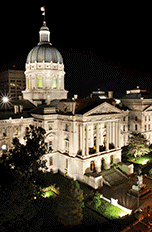 The most unbelievable surprise of the 2016 Indiana legislative session ended up being the bill to address the practice known as “lawsuit lending.” At the beginning and throughout much of the session, it was believed by all parties that this would be the year to reach an agreement on the issue. But as both sides began to define terms, it was clear that we weren’t really any closer than in years past.
The most unbelievable surprise of the 2016 Indiana legislative session ended up being the bill to address the practice known as “lawsuit lending.” At the beginning and throughout much of the session, it was believed by all parties that this would be the year to reach an agreement on the issue. But as both sides began to define terms, it was clear that we weren’t really any closer than in years past.
Lawsuit lending or civil proceeding advance payment transactions, as described in HB 1127, is the practice where a third party finance company loans money to a plaintiff in anticipation of a favorable settlement in a lawsuit. The finance companies justify a high interest rate because if the plaintiff does not win the suit, there is no requirement to repay the amount financed/loaned.
The Chamber has always maintained that this practice has an adverse impact upon the settlement/litigation process. As has been the case previously, Rep. Matt Lehman (R-Berne) was the author in the House and Sen. Randy Head (R-Logansport) was the author in the Senate. The Chamber and coalition members have supported Rep. Lehman’s position and the lawsuit lending industry has supported Sen. Head’s.
Representative Lehman took a different approach this year and attempted to place the transactions under the Uniform Consumer Credit Code (UCCC). Because of the way that interest rates and deferral interest rates are calculated for banks under the UCCC, there was some confusion as to how these transactions would operate for lawsuit lending purposes. To keep a long story short: The industry wanted a $500 document fee on all transactions, 36% interest rate cap and a 36% deferral fee. Due to how their product is financed, it effectually produced an interest rate of 72% – which was totally unacceptable to the Chamber, the Indiana Manufacturers Association, the Insurance Institute of Indiana and other business interests. During conference committee time, Rep. Lehman made several proposals to find common ground.
The night before the last day of session, the Chamber met with Senate President Pro Tem David Long (R-Fort Wayne) to discuss our concerns. He thought a deal might still be struck. Early the final day, a conference committee report was presented and the legal finance industry was opposed to it. By 10:30 a.m., all parties agreed that the bill was dead and we would be back next year to fight even stronger. As a result, most of the coalition members had returned to their respective offices for the day. A little after 11 a.m., the local contract lobbyist for the American Legal Finance Association approached the Chamber to see if there could be a tweaking of the fees if the interest rates were kept lower. Around 12:30 p.m., Rep. Lehman asked the coalition if all of us could live with a 36% interest rate, a 7% service fee, a $250 document fee for loans under $5,000 and a $500 document fee for loans in excess of $5,000. The kicker was that Lehman said that it would be calculated based upon APR (Annual Percentage Rate).
Immediately the Chamber and others said take the deal. Without the APR the deal would have been OK at best, but with APR this was a game-changer. The rest of the afternoon and evening we worked ferociously to get the Senate Democrats to get Sen. Greg Taylor (D-Indianapolis) to sign the conference committee report and get the bill passed. The final HB 1127 passed the Senate 40-10 and was in the last batch of bills to be voted on in the House, passing by a margin of 63-32.
The Chamber wants to thank Jon Zarich, representing State Farm, and Michael Niland and Logan Harrison of the Insurance Institute for their amazing efforts. Their partnership with the Chamber helped make the passage of lawsuit lending possible after six long years.

 Election year dynamics, conservative Republican super majorities and the non-budget nature of the “short” session create the context for all issues facing the Indiana General Assembly in 2016. In economic development, the only issues to see much traction are adding LGBT civil rights protections to the Indiana Code and a short-term fix for the state’s roads and highways with an emphasis on local funding. Other issues will arise, but are unlikely to gain much attention.
Election year dynamics, conservative Republican super majorities and the non-budget nature of the “short” session create the context for all issues facing the Indiana General Assembly in 2016. In economic development, the only issues to see much traction are adding LGBT civil rights protections to the Indiana Code and a short-term fix for the state’s roads and highways with an emphasis on local funding. Other issues will arise, but are unlikely to gain much attention.